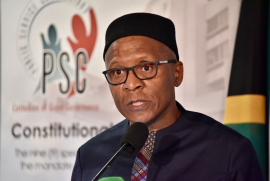
As part of professionalising the public service, government departments must conduct in-depth awareness and training for human resources practitioners on how to handle ethical challenges during recruitment and selection processes to ensure ethical hiring decisions.
This is among the recommendations included in the Public Service Commission’s Quarterly Bulletin, covering the period 01 April to 30 June 2022.
The bulletin, titled ‘The Pulse of the Public Service’, was released by PSC Commissioner, Anele Gxoyiya, on Thursday.
In the report, the PSC observed that despite having legislative and regulatory frameworks in place, ethical and moral challenges continue to undermine the National Development Plan Vision 2030 efforts of building a capable and developmental State, which ultimately affects organisational performance and service delivery.
Gxoyiya said human resource management practitioners have, over time, witnessed undue influence and ethical dilemmas that bring the entire profession into disrepute.
“Examples of such practices include amendments of job requirements during shortlisting processes and conflicts of interest amongst panel members due to failure to disclose crucial information during recruitment and selection processes.
“The magnitude of the challenge is supported by the high number of grievances relating to recruitment and selection that are referred to the PSC by employees and complaints received from members of the public, as well as allegations reported through various media platforms.”
Gxoyiya said the findings of the study conducted during 2021/2022 alluded to a complex relationship between non-compliance with prescripts, unethical practices and positional power in departments.
The findings highlighted, in particular that at the beginning of the recruitment and selection process, including advertising stage, recruitment and selection prescripts are followed.
However, the report noted, the challenges begin at the shortlisting and interviewing stages, where abuse of power by senior managers, including accounting officers and executive authorities, is witnessed by panel members when dealing with Senior Management Service (SMS) positions.
“The HR practitioners do not prevent such unethical actions due to fear of reprisal, harassment, victimisation and workplace bullying by some middle or senior managers and panel members,” Gxoyiya said.
Capacitating HR
The report recommended that concerted efforts should be dedicated towards capacitating HR, including line function managers, to deal with actual and/or perceived unethical recruitment and selection practices, given the centrality of ethics in professionalising the public service towards building a capable and developmental State.
“As part of strengthening awareness in the public service, the National School of Government, with the support of the Department of Public Service and Administration (DPSA), must incorporate HR professional ethics when conducting compulsory training and workshops on the public service ethics and frameworks.
“In addition, the DPSA should ensure that during this financial year, they make it compulsory for all public servants from levels 2 to 16 to re-internalise and sign the Constitutional Values and Principles and anti-corruption pledges, as well as the Code of Conduct annually.
“Such documents should be filed by the departments and employees should display these documents in their work spaces as a constant reminder of what is expected of them, and what they have committed themselves to,” Gxoyiya said.
He said public servants who conduct themselves unethically should be held accountable and whistle-blowers reporting unethical behaviour should be protected.
The Commissioner noted that while the immediate cause of protests in different communities may be triggered by matters including poor service delivery, high crime rate, improper roads, lack of water and sanitation, load shedding and potholes, government is compelled to reflect on how collective public decision-making should be undertaken in partnerships with the citizens.
“Public participation should be the cornerstone of democracy and ensure that we do not leave anyone behind,” Gxoyiya said. – SAnews.gov.za


